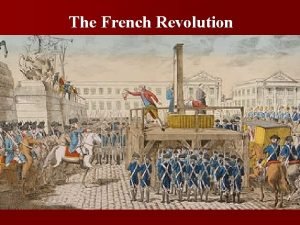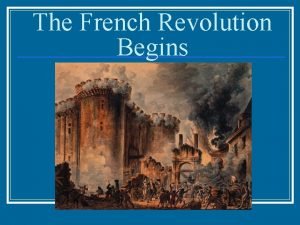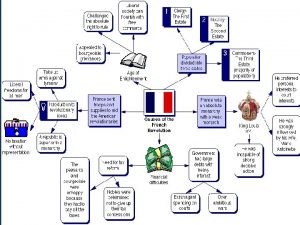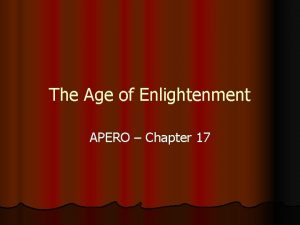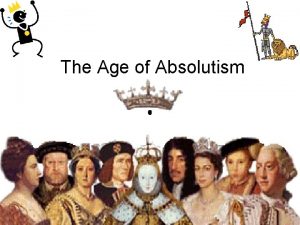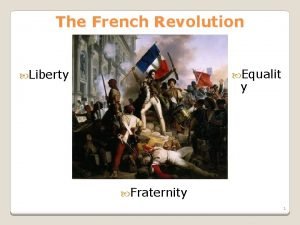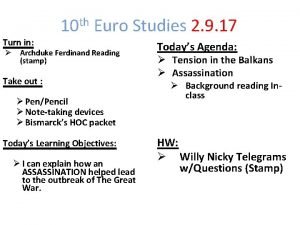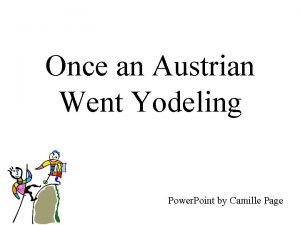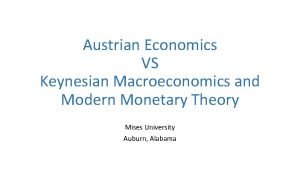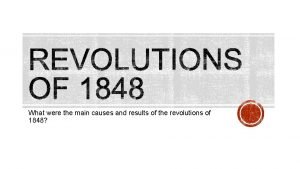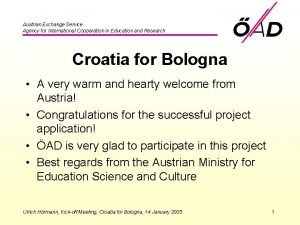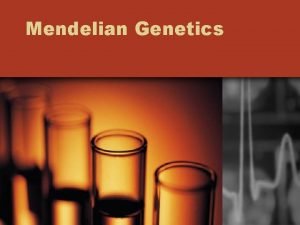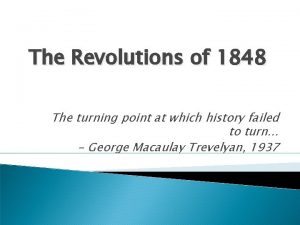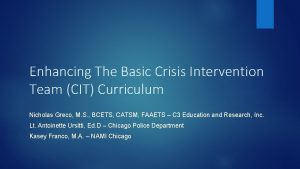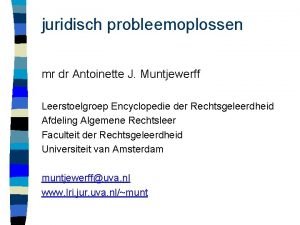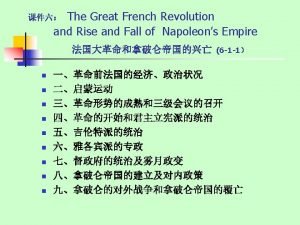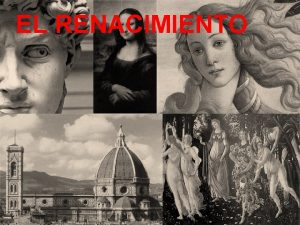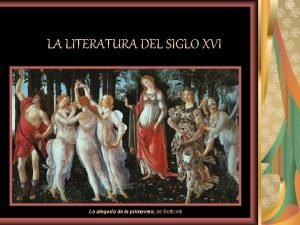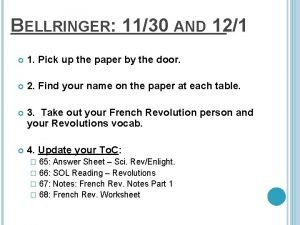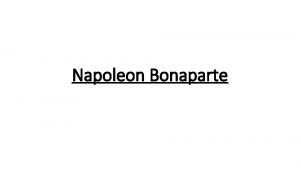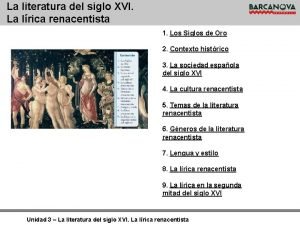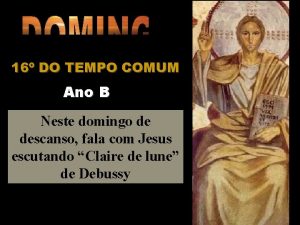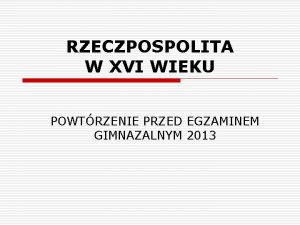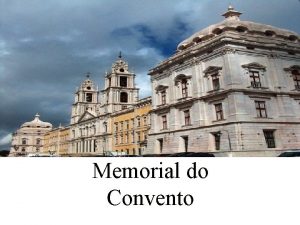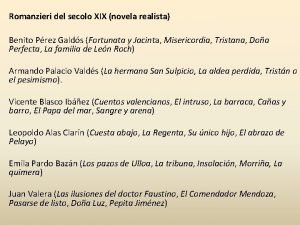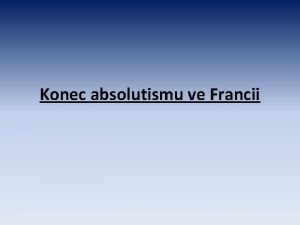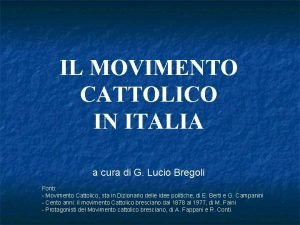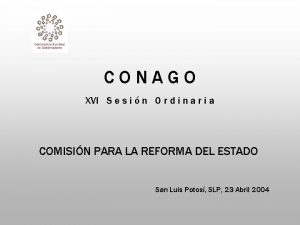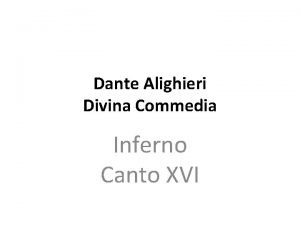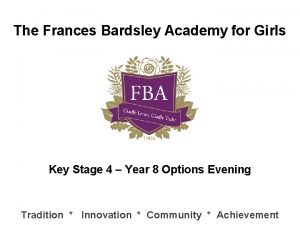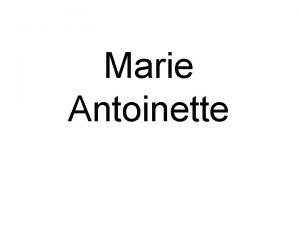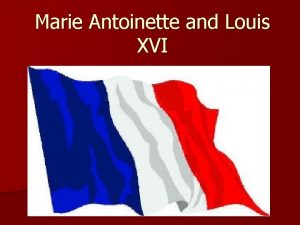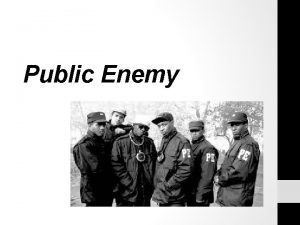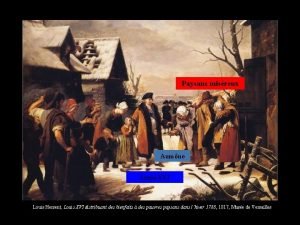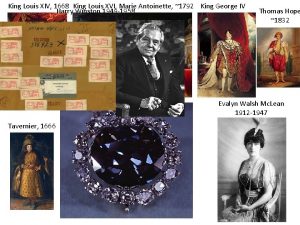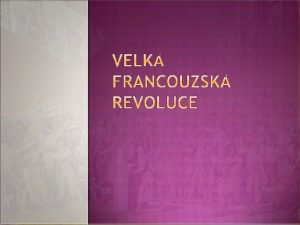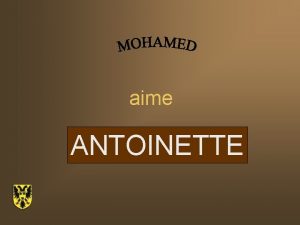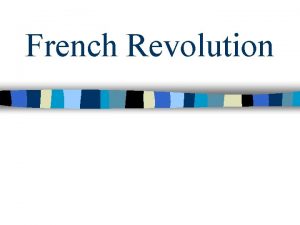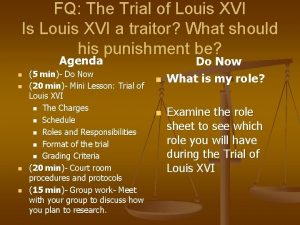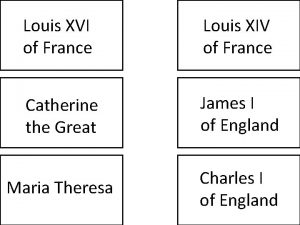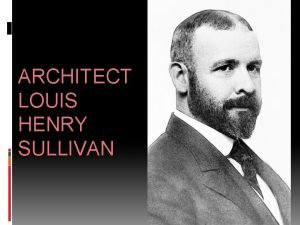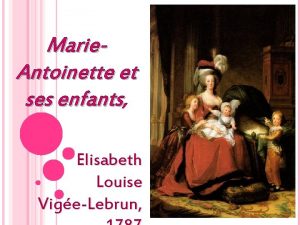Marie Antoinette Louis XVI Austrian Frances traditional enemy





























































- Slides: 61



Marie Antoinette & Louis XVI • Austrian – France’s traditional enemy before the Diplomatic Revolution of 1756 • “Madame Deficit” • France’s status already diminished – Seven Years’ War • Supports American Rev. • Wars bankrupt France

France experiences bad harvests • Nature doesn’t cooperate with the monarchy – France experiences droughts in 1788 and the coldest winter in memory in 1788 – 89. – Jacques Necker imports grain. • avoids famine, but prices skyrocket • “The [French] country is a heap of ashes. Grass is scarcely to be seen and all sorts of grain is short, thin, pale and feeble, while the flax is quite dead… I pity this people from my soul… No green peas, no salad, no vegetables to be had upon the road, and the sky is still as clear, dry and cold as ever. The flocks of sheep and herds of cattle stalk about the fields like droves of walking skeletons. ” - John Adams • What group is most hurt by rising bread prices?

The French Urban Poor

Convening the Estates-General May, 1789 Last time it was called into session was 1614! Why must Louis XVI call the Estates-General? He is trying to get the nobility to give up tax privileges Nobility wants to reform absolutism but this backfires


Socio-Economic & Political Inequality 1789: The “Ancien Régime” Taxes paid (taille) little none 50% of inc. letters de cachet = warrantless arrests bought by nobles corvée = forced labor on public works (roads) Votes (in Estates-General) 1 1 1 Reforms outvoted 2 to 1 major area of conflict arises over voting procedures

French Society

French Society

French Society

French Society

• Abbé Sieyès (a member of the clergy) wrote the above and asked: Ø What is the Third Estate? Everything. Ø What has it been hitherto in the political order? Nothing. Ø What does it desire to be? To become something. . . What is the Third Estate?

French Society

French Society

French Society

French Society

“The Tennis Court Oath” by Jacques Louis David June 20, 1789 “National Assembly” vows to meet until there is a new constitution

Moderate Phase 1789 - 1792 • “Age of Montesquieu” • Who is in charge? – Bourgeoisie • Goals: – end noble privilege – lessen church influence – Constitutionalism (limited monarchy) – economic liberalism

Storming the Bastille, July 14, 1789 In reaction to Louis XVI mobilizing troops The French people are behind the National Assembly Sans-culottes and Paris city govt become political players

The Great Fear • Peasant reaction Ø attacked noble manors Ø destroyed legal records of feudal obligations. • 8/4: Nat’l Assembly abolishes “feudalism” by eliminating Ø corvée (forced labor) Ø noble hunting privileges Ø feudal dues, tax exemptions • Peasants want to keep gains Ø more conservative AFTER the Great Fear Ø turned off by later radicalism of the sans-culottes Ø purchase much of confiscated church land

The Declaration of the Rights of Man 1789 and of • August the Citizen • Enlightenment ideas Ø Ø Natural rights Sovereignty lies with people Equality under law Freedom of religion • Universal language used could be applied anywhere • Major flaw Ø Women relegated to domestic sphere (Rousseau)

Women’s March on Versailles October 5 -6, 1789 A demonstration of Parisian women (sans-culottes) for bread. “Let them eat cake”

King is a captive of Paris The king was thought to be surrounded by evil advisors at Versailles so he was forced to move to Paris and reside at the Tuileries Palace.

Women and the Revolution Ø Women played vital role in the Rev. • Storming of the Bastille • Women’s march, etc. Ø But, The Declaration of the Rights of Man did NOT extend the rights and protections of citizenship to women. Ø Reaction: Declaration of the Rights of Woman and of the Citizen (1791) Olympe de Gouges (1745 -1793) Later executed during the Reign of Terror for criticizing the Revolution A Vindication of the Rights of Woman (1792) Mary Wollstonecraft

Constitution of 1791 • Constitutional monarchy – king has limited power • 5 year suspensive veto • form cabinet, appt. ministers • only taxpaying “active”(vs. “passive”) citizens could vote • only property holders could hold office – limits eligibility to 50, 000 out of 25 million people – Represents transfer of political power to the bourgeoisie • attempt to limit public pressure (fear the mob) – limits representation of poor • poor turn to political clubs • Jacobins

Civil Constitution of the Clergy Ø Church property seized (helps state finances) o Many peasants buy church lands Ø Govt. to pay clergy salaries Ø Catholic Church becomes a branch of the state o secularization Ø Clergy are elected, must take oath to state o “refractory clergy” refuse o alienates church, devout now have divided loyalties o many commoners come to support refractory clergy

Enact Policies of Economic • Policies favor bourgeoisie Liberalism over san-culottes. Ø The metric system replaces a sloppy system of weights and measures. o better for trade o less waste Ø Internal tariffs abolished. o appeals to merchant class Ø Le Chapelier Law (1791) outlawed guilds, strikes, workers associations and assemblies. o enrages san-culottes who are now completely vulnerable to market forces o Poor urban residents become increasingly radical

Counter-revolutionaries

Counter-revolutionaries

• • • The Flight to Varennes June, 1791, King makes a run to the border recognized/captured at Varennes King is now viewed as a traitor!!!

Legislative Assembly (1791 – 92) “descent into chaos” • passionately committed to defense of revolution. – lead the country into war. • declared war on Austria in April 1792. • France suffers a series of defeats • Jacobins blame defeats on Louis XVI, believing him to be part of a conspiracy with Prussia and Austria. • Paranoid sentiment stoked by Maximilien Robespierre, Georges Danton, and the journalist, Jean-Paul Marat.

The September Massacres, 1792 (Welcome to the dark side) M Rumors that anti-revolutionary political prisoners were plotting to break out & attack from the rear the armies defending France, while the Prussians attacked from the front. M over 1000 killed! M Discredited Revolution with its remaining sympathizers abroad.

• “Age of Rousseau” • Republic • Who is in charge? – Jacobins (political club allied with radical ideas) Radical Phase 1792 - 1794 • Spilt between Girondin • Mountain (Robespierre & Danton) – Sans-culottes (working class artisans and Paris Commune) • Goals: – – win war defeat counterrevolutionaries “Republic of Virtue” Economic control to maximize war production and satisfy urban poor. – destroy Catholic church

Maximillian Robespierre (1758 – 1794)

The Sans-Culottes: The Parisian Working Class (Urban Poor)

Jean-Paul • publishes Friend of the Marat People (1744 – 1793) • Links sans-culottes and Jacobins • consistently warned against counterrevolutionaries and called for executions – "five or six hundred heads cut off would have assured your repose, freedom and happiness. “ • supported Sept. massacres • attacks Girondins as enemies of the Republic – accuses them of having royalist

The Assassination of Marat by Charlotte Corday

“The Death of Marat” by Jacques Louis David • Bloodthirsty Marat now a martyr of the Revolution • Notice body positioning closely matches the Pieta – “Neoclassical art”

The Politics of the National Convention (1792 -1795) Jacobins “Mountain” « Power base in Paris. « San-culottes « Paris Commune « “left” or the “mountain” « want to execute the king « extreme measures needed Girondists « base in the provinces. « “right” « King should not be killed « Want limited monarchy « Evicted from Convention

The Death of “Citizen” Louis Capet Louis XVI’s Head (January 21, 1793)

Accompishments of the National Convention M Universal male suffrage M abolishes slavery o Toussaint L’Ouverture o Haitian independence M Law of the Maximum o o price controls nationalization rationing early socialism M levée en masse o France turns tide in the war o Begins to export Revolution

levee en masse: Nation at Arms! – “nationalism” put to work an army based on merit not birth, loyal to the nation not king, Vive la France, Vive la République

French Nationalism = Fraternity (brotherhood) FRANCE Expansion 1792 - 99 AUSTRIA PRUSSIA BRITAIN SPAIN PIEDMONT

Committee of Public Safety M 12 -man committee set up to protect republic from enemies (both foreign and internal) o Effectively a twelve person dictatorship M Lead by Robespierre o Includes Danton M Reign of Terror o 300, 000 arrested. o 20, 000 – 40, 000 executed.

The Reign of Terror is nothing other than justice, prompt, severe, inflexible. -- Robespierre Let terror be the order of the day! Ø The Revolutionary Tribunal of Paris alone executed 2, 639 victims in 15 months. Ø The total number of victims nationwide was over 20, 000!

Robespierre on the use of terror • "It is time that equality bore its scythe above all heads. It is time to horrify all the conspirators. So legislators, place Terror on the order of the day! Let us be in revolution, because everywhere counterrevolution is being woven by our enemies. The blade of the law should hover all the guilty. "

How to deal with Counterrevolution? The Vendee Revolt, 1793

Vendee Revolt, 1793 Vendee Symbol: For God & the King! Drowning the Traitors!

Marie Antoinette on the Way to the Guillotine October 1793

Different Social Classes Executed 7% 8% 25% 31%

Religious Terror: De-Christianization (1793 -1794) M Church linked with counter -revolution. M Religion associated with Ancien Régime M De-Christianization is very popular among the sansculottes. M religion has no place in a rational, secular republic! Ø Ø Ø change street names desecrate churches murder clergy force priests to marry remake calendar to eliminate Sundays

The “Temple of Reason” • Robespierre is a deist – Actually opposed to Hebert’s atheism – Hebert guillotined • Creates “Cult of the Supreme Being”

The Festival of Supreme Being

The “Thermidorean Reaction, ” 1794 Ø July 26 Robespierre gives a speech hinting at new plots & conspiracies. Ø many felt threatened by his implications. Ø July 27 Robespierre arrested Ø July 28 Robespierre tried & guillotined!

The Arrest of Robespierre

The Revolution Consumes Its Own Children! Danton Awaits Execution, 1793 Robespierre had him executed for calling for an end to the “terror” Robespierre Lies Wounded Before the Revolutionary Tribunal that will order him to be guillotined, 1794.

• Return to bourgeoisie control Ø five man executive committee Ø office holders must own property Ø corruption Ø pressure from both the right (royalists) and left (Jacobins) o Directory is dependent on military for protection o Napoleon puts down royalist uprising with a “whiff of grapeshot” o begins his rise to fame o Napoleon overthrows in a coup in Nov. 1799 The Directory

Two outside reactions to the French Revolution Edmund Burke Thomas Paine

Two reactions to the French Revolution Edmund Burke Thomas Paine • Reflections on the Revolution • Rights of Man (1791) Ø responded to Burke’s in France (1790) Ø one of the great intellectual defenders of European conservatism. Ø supported inherited privileges Ø predicted anarchy and dictatorship in France. Ø advised England to go slow in adapting its own liberties. argument by defending Enlightenment principles and France’s revolution. Ø saw it as a triumph of liberty over despotism. Ø Ironically he is almost executed during the Terror • Overall: some kings and o Britain eventually suppressed nobles of Europe who dissent initially welcomed the Ø Eventually, urged war as an Revolution to weaken ideological struggle against France, began to feel French barbarism. Ø Father of modern conservatism threatened when it became more radical.

The Sans-Culottes Depicted as Savages by a British Cartoonist.
 Jacques louis david marie antoinette
Jacques louis david marie antoinette Vl louis vuitton
Vl louis vuitton Antoinette tan
Antoinette tan French estates political cartoon
French estates political cartoon Marie antoinette lafeyette cartoon
Marie antoinette lafeyette cartoon Marie antoinette napoleon
Marie antoinette napoleon Raja marie antoinette
Raja marie antoinette Marie antoinette accomplishments
Marie antoinette accomplishments Marie-antoinette of france
Marie-antoinette of france Roman period floral design
Roman period floral design Marquette and joliet accomplishments
Marquette and joliet accomplishments The royal family tree from henry viii to present
The royal family tree from henry viii to present Define louis xvi
Define louis xvi Louis xvi head
Louis xvi head Austrian ultimatum to serbia
Austrian ultimatum to serbia Austrian e-card
Austrian e-card Once an austrian went yodeling on a mountain so high
Once an austrian went yodeling on a mountain so high Austrian economics vs keynesian
Austrian economics vs keynesian Austrian empire 1848
Austrian empire 1848 Austrian academic exchange service
Austrian academic exchange service Austrian genetic traits
Austrian genetic traits Austrian ultimatum to serbia
Austrian ultimatum to serbia Austrian succession
Austrian succession Cdda wind turbine
Cdda wind turbine Austrian empire 1848
Austrian empire 1848 What is the phenotype of a chicken with the genotype fbfw
What is the phenotype of a chicken with the genotype fbfw Blank is the austrian monk who experimented with blank
Blank is the austrian monk who experimented with blank Gregor mendel austrian monk
Gregor mendel austrian monk Manuela lenk
Manuela lenk Austrian-serbian
Austrian-serbian Françoise-antoinette pancrazzi
Françoise-antoinette pancrazzi Antoinette camilleri
Antoinette camilleri Antoinette caruana
Antoinette caruana Basic crisis intervention
Basic crisis intervention Antoinette frissell bacon
Antoinette frissell bacon Antoinette muntjewerff
Antoinette muntjewerff 1715-1638
1715-1638 El barroco siglo xvi
El barroco siglo xvi Literatura siglo xvi
Literatura siglo xvi Xvi bellringer
Xvi bellringer Luís xvi
Luís xvi Tenn. code ann. § 67-4-708(3)(c)(i-xvi)
Tenn. code ann. § 67-4-708(3)(c)(i-xvi) Lírica renacentista (siglos xvi-xvii)
Lírica renacentista (siglos xvi-xvii) Cristo re benedetto xvi
Cristo re benedetto xvi Romanzo in prosa
Romanzo in prosa Domingo xvi do tempo comum ano b
Domingo xvi do tempo comum ano b Benedetto xvi nozze di cana
Benedetto xvi nozze di cana Rzeczpospolita w xvi wieku sprawdzian
Rzeczpospolita w xvi wieku sprawdzian Memorial do convento personagens
Memorial do convento personagens Novela realista siglo xvi
Novela realista siglo xvi Rue de seine paris
Rue de seine paris Den kdy byl popraven ludvík xvi
Den kdy byl popraven ludvík xvi Mujer portuguesa
Mujer portuguesa Ludvík xvi
Ludvík xvi Tenn. code ann. § 67-4-708(3)(c)(i-xvi)
Tenn. code ann. § 67-4-708(3)(c)(i-xvi) Prosa del siglo xvi
Prosa del siglo xvi Papa gregorio xvi
Papa gregorio xvi Bof xvi
Bof xvi Canto xvi inferno
Canto xvi inferno Frances rudge kazan
Frances rudge kazan Frances bardsley academy
Frances bardsley academy Maria frances ackley
Maria frances ackley
